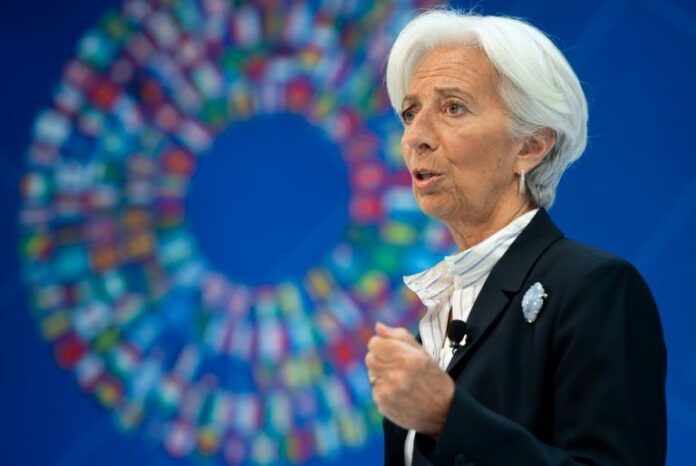WASHINGTON: The reshuffle of leadership positions in Europe now forces world finance officials into a search for a new manager for the International Monetary Fund two years ahead of schedule.
After her nomination on Tuesday to lead the European Central Bank, Christine Lagarde has stepped away from post she has held since 2011 and in which she led the IMF bailouts to restore order following the global financial meltdown.
But the outcome of the search for her replacement almost certainly will end in the same place that it has since the global crisis lender was created in the aftermath of World War II: with a European picked to serve as managing director.
While large emerging market nations have long called for more representation in important financial bodies to reflect their increased weight in the global economy, the choice earlier this year of American David Malpass to lead the World Bank, the IMF’s sister institution, showed the unwritten rule remains in place.
“The ease with which the US preserved the duopoly, means the Europeans will definitely want to keep their mitts on it,” former US Treasury official Mark Sobel told AFP.
A French government source agreed: “It must be a European,” he said.
Five of the IMF’s 11 leaders have been French nationals and they have been the longest serving in the institution’s 75 year history.
Early candidates mentioned as possible successors to Lagarde include Bank of France chief François Villeroy de Galhau, French politician Pierre Moscovici, the EU finance commissioner, and Mark Carney, a Canadian who also holds British and Irish citizenship and whose term as leader of the Bank of England is up next year.
Another possibility is Kristalina Georgieva, the Bulgarian chief operating officer of the World Bank, who served as its interim president before Malpass was named. If selected, she would only be the second woman to lead one of the institutions.
A More Open Process
Advanced economies were the epicenter of the 2008 global financial crisis, and in the aftermath the leaders of the Group of 20 countries agreed that major developing nations like China, India and Brazil should have greater representation in the multinational institutions, including serving in leadership roles.
But when the top job at the IMF suddenly opened up in 2011, the European nations balked. With the crisis at their doorstep, and Greece almost literally going up in flames, leaders argued that the time was not right.
Emerging markets called out the hypocrisy but never unified behind Agustin Carstens, then head of the Mexican central bank and now leader of the Bank for International Settlements, and a veteran of senior posts at the IMF and widely seen as qualified.
Carstens was the lone candidate to challenge Lagarde in 2011 but never received sufficient support.
When the World Bank job opened up this year there was no competition to the US choice.
“My view is it should be open to everyone in the world,” Sobel said. But the emerging markets “didn’t step up to the plate.”
With 16.5pc of the voting shares, the United States has a veto at the IMF, as do the EU members with just over 21pc combined, although they are dispersed among different voting blocs.
The IMF board includes 24 directors representing the 189 members, with only the Washington, Tokyo (6.2pc) and Beijing (6.1pc) representing their countries alone.
Last week, before the leadership change, Carstens said it was “urgent” to reform the IMF to give the emerging markets more voice since that would improve the fund’s legitimacy.
“If they are represented, that would give more legitimacy to the advice that the fund provides,” he said. “I think that is an urgent reform and hopefully we can move more quickly in that direction.”
In principle, the IMF board has established an open, merit-based selection process for choosing a managing director, and now accepts nominations from any member country. Candidates would be narrowed down to a short list of three and then interviewed.
The board has said a candidate “will have a distinguished record in economic policymaking at senior levels. He or she will have an outstanding professional background, (and) will have demonstrated the managerial and diplomatic skills needed to lead a global institution.”

























It’s ludicrous to talk of a leadership crisis in an undemocratic institution- the IMF -when just four powerful nations or political blocks (US, the European Union, Japan and China) monopolize the IMF. Majority of 24 directors control policy making and global lending in their own respective vested political and economic interests. Whoever is chosen as the manager of IMF will not bother to give any priority to global poverty, mass migration, ethnic cleansing, unemployment, illiteracy, and endemic global health issues like cholera, tuberculosis, hepatitis, diarrhoea, and stunted growth of children facing a vast majority of the rest of 185 countries.
The IMF was originally set up to be a global loan shark and nothing will change it unless it is democratized along with the World Bank, IBRD and IDA.
The only way to bring change in IMF would be to allow a fair and just representation of Asian, African and developing/less developed nations on the executive board and to democratize the election process of the IMF Managing Director.